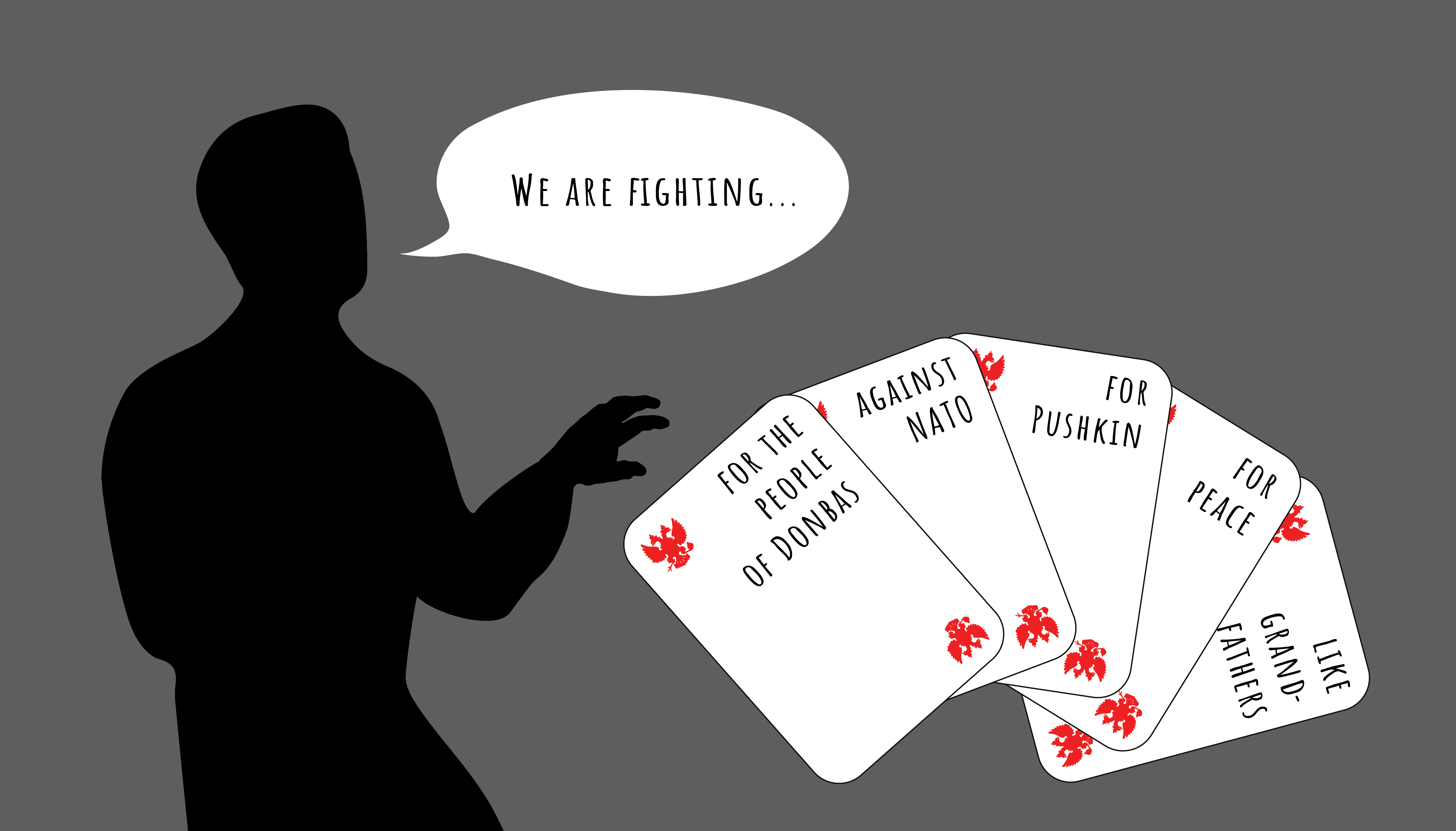Українською читайте тут.
This is Detector Media’s team of analysts speaking. During the time we were keeping quiet, we managed to prepare a lot of exciting content.
We analyzed more than 99,000 posts from 1,255 Telegram channels in the Ukrainian and Russian segments of the social network, with the data provided by LetsData. Our study focuses on the main propaganda messages used by the Russian propaganda machine to justify its actions during the twelve months of the ongoing full-scale invasion, which began on February 24, 2022. The study examines how these messages have evolved over the course of the year. This is a large study ( a big one, really, the summary was initially over 20 pages long, though it got a bit shorter after editing) in which we cover both well-known messages that Russia used to justify its actions and new ones.
Using such messages, Russian propaganda seeks to justify and, in some cases, explain Russia’s actions in Ukraine. For example, using the narrative of so-called military provocations by Ukraine or NATO, the propaganda machine constructs a reality of its own, where Russia appears forced into a situation and, to some extent, becomes a victim. In the propaganda-distorted reality, Russia is no longer an aggressor that attacks another sovereign state, violates the integrity of its borders, kills civilians, and destroys cities and villages, but rather a country that is allegedly forced to defend itself. Russian propaganda repeats the message that if Russia had not started the war, the situation could have only gotten worse. However, the propagandists do not specify what exactly would have happened, instead repeating stories about an alleged conspiracy against Russia by the United States and Ukraine, bio laboratories, dirty bombs, the terrible NATO, etc. Through these so-called justification messages, Russia is also portrayed as a kind of peacemaker that seeks international peace rather than one that starts wars and kills people. Read more here.
Over the past few weeks, Detector Media analysts have also been preparing compilations of Russian disinformation messages. In particular, Lesia Bidochko listened to Viktor Medvedchuk’s speech on a Belarusian channel. In his statement, Medvedchuk said that he was returning to the big game, launching a new political project called ‘The Other Ukraine’’ and would try to ‘demonopolize President Zelenskyy’s right to represent Ukraine internationally.’ All the points he made are consistent with the rhetoric of Russian propaganda, which has been spreading dozens of disinformation messages to various audiences over the course of the year of the full-scale invasion. For example, Medvedchuk states that Ukraine has consistently failed peace talks and tried to ‘get rid’ of the Donbas; that the West was seeking to destabilize the situation near Russia’s borders; the West did not pressure Kyiv to fulfill the Minsk agreements; that Ukraine is a failed state because it has lost its sovereignty, independence, and democracy. For more information, click here.
Analyst Viktoriia Namestnik also prepared a selection of disinformation messages that emerged in the media environment amid news of Ukrainian President Volodymyr Zelenskyy’s visit to the UK, France, and Belgium. For example, propagandists claimed that Zelenskyy’s visit was a distraction from the situation in Bakhmut; that Zelenskyy’s trip to Europe was ‘ suppressing’ the corruption scandal in Ukraine; that Zelenskyy had ceased to be a ‘bunker ruler’ after disproving the myth that Putin wanted to kill him, and more.
However, Detector Media also collected disinformation messages about the visit of another president, US president Joe Biden, to Ukraine. Artur Koldomasov has learned that propagandists wrote about Biden visiting Ukraine to say that he was ‘surrendering’ Ukraine; that the air alert was activated for ‘theatrics’ to scare President Biden: that Biden’s visit was just a PR stunt for Biden and Zelenskyy, etc.
Lastly, can I ask you a question? What do you know about corruption in Ukraine? It seems that Russian propagandists are the ones who know the most. For years, they have been saying that Ukraine is the most corrupt country in Europe. At the end of January, when corruption scandals came to light in Ukraine, Russian propaganda once again brought up the issue, portraying Ukraine as one of the most corrupt nations worldwide. The government was accused of profiteering from the war, with claims that the only reason they continued to fight was for the sake of money and corruption schemes. Moreover, the public was intimidated by messages suggesting that Ukraine’s Western partners may stop supplying weapons and won’t help in the fight against Russia because of corruption. The Russian propaganda machine employs a range of tactics and tools to promote these false narratives. Analyst Lesia Bidochko has compiled and thoroughly explained how they work and why Russia relies on them.
Join our mailing list and sign up for the Newsletters
Detector Media: Stay in the know.



